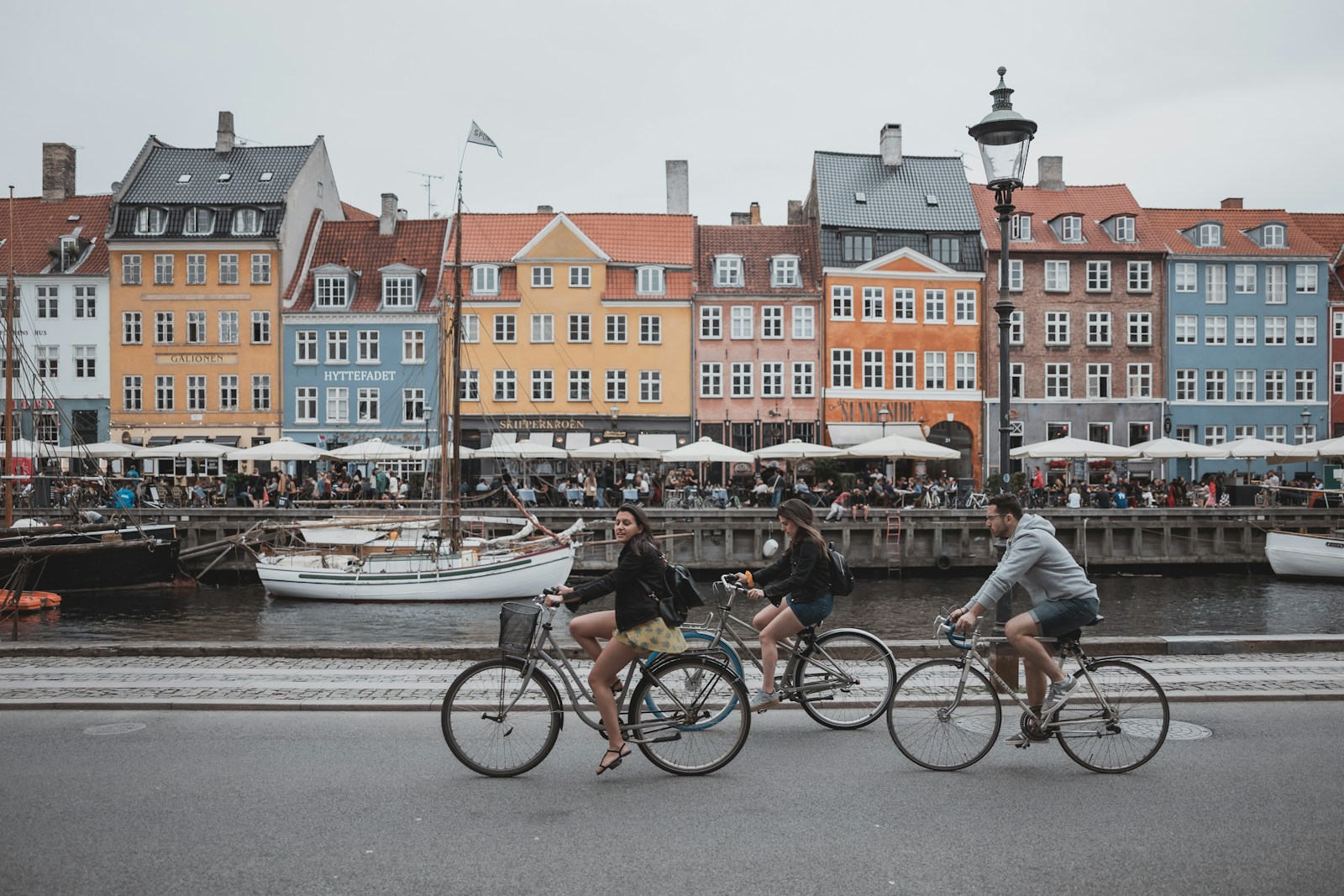Denmark is often ranked as one of the wealthiest and happiest countries in the world. With a high GDP per capita, a strong welfare state, low levels of corruption, and political stability, Denmark enjoys both economic prosperity and a high quality of life for its citizens. But what makes Denmark so rich? The answer lies in a combination of historical developments, natural resource management, a thriving economy, progressive policies, and social structures that have allowed Denmark to grow into a prosperous nation.
This article explores the key factors that contribute to Denmark’s wealth and success. From its industrial development and welfare state model to its green economy and innovative industries, we’ll examine why Denmark has become one of the most prosperous countries in the world.
1. A Strong, Diversified Economy
Denmark’s wealth is largely attributed to its strong and diversified economy. Unlike many other countries that rely heavily on one or two key industries, Denmark has developed a broad range of economic sectors that contribute to its overall wealth. These sectors include manufacturing, agriculture, services, shipping, and renewable energy.
Manufacturing and High-Value Exports
Denmark has a robust manufacturing sector, particularly in high-value industries like pharmaceuticals, medical devices, food processing, and industrial machinery. Companies like Novo Nordisk (a global leader in diabetes treatment), Lego, and Maersk (the world’s largest container shipping company) have built Denmark’s reputation as an exporter of high-quality products.
Denmark is also known for its strong agriculture and food production sectors, which produce and export dairy products, pork, and processed foods. Brands like Arla Foods and Danish Crown are recognized globally, contributing significantly to Denmark’s export revenues.
Shipping and Global Trade
Denmark’s strategic location near major European shipping routes has long made it a hub for international trade. The country’s shipping industry is one of the largest in the world, dominated by Maersk, a global leader in container shipping and logistics. Denmark’s expertise in maritime industries extends beyond shipping to shipbuilding, marine technology, and offshore services, which further drive its economic growth.
Renewable Energy Leadership
Denmark is a global leader in renewable energy, particularly in wind power. The country has invested heavily in wind energy since the 1980s, and today, wind turbines generate over 40% of Denmark’s electricity. Denmark’s expertise in wind technology has not only reduced its dependence on fossil fuels but has also created a booming export industry for wind turbines and green energy solutions. Danish companies like Vestas and Ørsted are global leaders in wind energy and have contributed significantly to Denmark’s wealth.
2. A Thriving Welfare State and Social Safety Nets
Denmark’s wealth is closely linked to its comprehensive welfare state, which provides all citizens with access to essential services such as healthcare, education, pensions, and social security. The Danish welfare system is one of the most generous in the world, and it is financed through a system of progressive taxation, where wealthier individuals and businesses contribute a larger share of their income to fund social programs.
Universal Healthcare and Education
Denmark’s universal healthcare system ensures that all citizens have access to free or low-cost medical services. This system is funded by taxes and provides high-quality healthcare for everyone, regardless of income. The country’s healthcare system plays a key role in maintaining a healthy and productive workforce, which contributes to Denmark’s overall economic success.
In addition to healthcare, education in Denmark is free from primary school through university. The emphasis on providing high-quality education to all citizens ensures that Denmark has a well-educated workforce, capable of contributing to its growing economy. Denmark’s education system is also known for its focus on innovation, creativity, and entrepreneurship, which are essential for fostering a dynamic economy.
Strong Social Safety Nets
Denmark’s welfare state also includes strong social safety nets, such as unemployment benefits, paid parental leave, and generous pensions. These programs ensure that citizens are protected during times of financial hardship, illness, or unemployment. Denmark’s flexicurity model is a key feature of its labor market, combining the flexibility of a dynamic labor market with the security of social safety nets. This system allows workers to change jobs or take entrepreneurial risks, knowing they have a safety net to rely on if needed.
Income Equality and Social Cohesion
One of the most remarkable features of Denmark’s welfare state is its ability to promote income equality. Denmark consistently ranks among the countries with the lowest levels of income inequality, thanks to its redistributive policies. The progressive taxation system and generous social programs ensure that wealth is shared broadly across society, reducing poverty and promoting social cohesion.
This focus on equality fosters a stable and prosperous society where citizens feel secure and are more likely to invest in their education, health, and businesses. Denmark’s high levels of social trust and cohesion also contribute to its overall wealth, as a harmonious society is more resilient and economically productive.
3. Progressive Taxation and Fiscal Responsibility
Denmark’s ability to fund its welfare state while maintaining a strong economy is largely due to its progressive taxation system and commitment to fiscal responsibility. While taxes in Denmark are relatively high compared to other countries, the country has implemented policies that ensure taxes are used efficiently to support long-term growth and stability.
High Taxes, High Returns
Denmark’s tax system is designed to be both progressive and efficient. High-income earners and corporations pay higher tax rates, but these taxes fund services that benefit the entire population. Free education, universal healthcare, generous parental leave, and other welfare benefits contribute to a productive and satisfied workforce. This, in turn, leads to higher levels of economic output and social stability.
Business-Friendly Environment
Despite high taxes, Denmark remains a highly attractive place for businesses. The Danish government has implemented policies that incentivize investment and foster a business-friendly environment. Corporate tax rates in Denmark are relatively low compared to other European countries, and businesses benefit from simplified regulations and investment in innovation. The country’s strong infrastructure, skilled workforce, and global trade links make it an ideal location for companies to grow and thrive.
Fiscal Responsibility
Denmark is known for its fiscal prudence and low public debt levels. The Danish government has consistently managed its finances responsibly, ensuring that the welfare state is well-funded without accumulating excessive debt. Denmark’s focus on long-term financial planning and sustainable budgeting has allowed it to maintain economic stability and avoid many of the financial crises that have affected other European countries.
4. Innovation, Research, and Technological Development
Denmark’s wealth is also driven by its strong emphasis on innovation, research, and technological development. The Danish government and private sector invest heavily in research and development (R&D), which has allowed the country to remain competitive in global markets and develop new industries in areas like green technology, biotechnology, and information technology.
Green Innovation and Sustainability
Denmark has positioned itself as a global leader in green innovation and sustainability. The country has ambitious goals for reducing carbon emissions and transitioning to a green economy, with policies that promote the use of renewable energy, energy efficiency, and sustainable practices in agriculture and industry.
Denmark’s expertise in wind power is a prime example of its commitment to green innovation. The country’s investments in wind energy have not only made Denmark a leader in renewable energy but have also created new industries, jobs, and export opportunities. Danish companies like Vestas, one of the world’s leading wind turbine manufacturers, are at the forefront of the global renewable energy sector.
Investment in Research and Development
Denmark’s government allocates a significant portion of its budget to research and innovation. Universities, research institutes, and private companies collaborate on projects that drive technological advancements and create new economic opportunities. Denmark’s focus on biotechnology has resulted in breakthroughs in areas like pharmaceuticals and life sciences, with companies like Novo Nordisk playing a leading role in the global healthcare industry.
Denmark’s high investment in digital infrastructure has also fostered a thriving tech industry, with Danish start-ups and tech companies making strides in fintech, software development, and artificial intelligence. The combination of government support, private sector investment, and a highly skilled workforce has made Denmark one of the most innovative economies in the world.
5. Political Stability and Good Governance
Denmark’s wealth is closely tied to its high level of political stability and good governance. The country consistently ranks among the least corrupt nations in the world, according to organizations like Transparency International. Denmark’s political system is characterized by transparency, accountability, and a commitment to the rule of law, which creates a stable environment for businesses and individuals to thrive.
Consensus-Driven Politics
Denmark’s political system is based on consensus-driven politics, where different political parties, labor unions, and business groups work together to find common ground on important economic and social issues. This collaborative approach has resulted in policies that benefit a broad spectrum of society, rather than serving the interests of a select few.
Low Corruption and High Trust
Denmark’s low levels of corruption are a key factor in its economic success. Citizens and businesses alike trust that the government will manage public funds responsibly and make decisions that benefit the entire country. This high level of trust creates a positive environment for investment and economic growth.
Long-Term Planning and Sustainability
Denmark’s government is known for its focus on long-term planning and sustainability. Policies are designed with future generations in mind, ensuring that Denmark’s wealth is maintained and that the country continues to thrive in the years to come. This approach to governance has helped Denmark avoid many of the financial crises and social unrest that have plagued other nations.
6. High Quality of Life and Social Cohesion
Denmark’s economic success is closely tied to its high quality of life and strong social cohesion. The country consistently ranks among the top in global happiness and well-being indices, thanks to its strong welfare state, low income inequality, and emphasis on work-life balance.
Work-Life Balance and Productivity
Denmark’s focus on work-life balance is a key factor in its high levels of productivity and economic success. Danish workers enjoy generous vacation time, flexible working hours, and parental leave policies that allow them to maintain a healthy balance between their personal and professional lives. This balance contributes to higher levels of job satisfaction, lower stress, and improved productivity.
Social Trust and Community
Denmark’s emphasis on social equality and inclusivity fosters a high level of social trust. Citizens trust their government, institutions, and each other, creating a cohesive society where individuals feel secure and supported. This sense of trust and community contributes to Denmark’s overall economic stability, as social cohesion reduces the likelihood of conflict and promotes collaboration.
Conclusion
Denmark’s wealth and prosperity can be attributed to a combination of factors, including its strong and diversified economy, comprehensive welfare state, investment in innovation, and political stability. The country’s ability to balance economic growth with social equality and environmental sustainability has allowed Denmark to build a thriving and resilient economy.
Denmark’s commitment to progressive taxation, fiscal responsibility, and long-term planning has ensured that its wealth is distributed equitably and that future generations will continue to benefit from the country’s prosperity. The Danish model of economic success, which combines a robust welfare state with a competitive, innovative market economy, serves as a blueprint for other nations seeking to achieve sustainable and inclusive growth.




